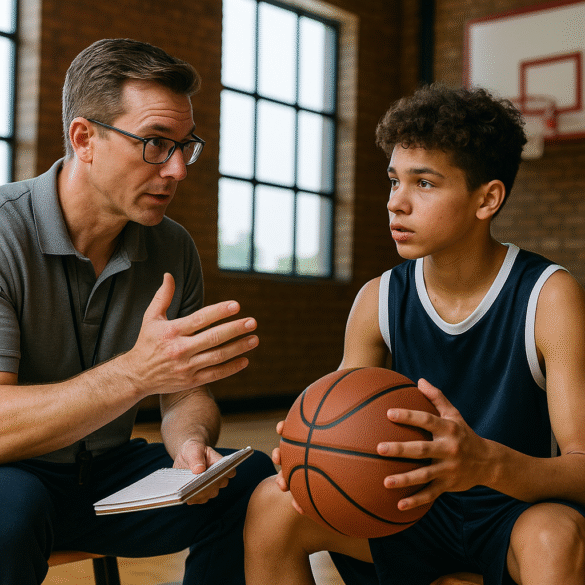Sports psychology has increasingly become a critical factor in shaping performance, particularly in the world of youth sports. In basketball, where decision-making, mental strength, and teamwork define success, the role of psychology cannot be overstated. Incorporating sports psychology in basketball training not only adds young players’ skill on the floor but also enhances their mental strength, emotional awareness, and focus. As youth athletic programs evolve, the integration of sports psychology techniques becomes an essential part of youth athletic training.
Mental Strength Builds Confidence in Players
One of the most important advantages of sports psychology in basketball is how it advantages player confidence. Teenagers are often prone to coping with self-doubt, performance anxiety, and fear of failure. By integrating mental training exercises like visualization, positive self-talk, and relaxation, coaches can build players’ confidence.
This form of psychological help helps players to recover from mistakes during games and to develop a growth mindset. Especially in the young sport training, when athletes are in the early stages of learning a skill, toughness of mind is all-important. A confident player is not merely more ferocious in action but also more inclined to take useful criticism positively.
Improving Focus and Game Intelligence
Basketball calls for quick decision-making, paying attention to team dynamics, and a fierce understanding of the game strategy. Basketball sports psychology helps young athletes acquire focus skills using techniques like goal setting and mindfulness. Once athletes understand how to focus only on the moment’s task, they cut distraction and increase the game’s intelligence.
As a component of structured youth athletic training, junior players may be trained through scenario-based mental workouts. These simulations habituate their response under situations of high pressure, improving their ability for rapid information processing and beneficial decision-making on the field of play.
Management of Stress and Pressure During Competition
Competing in front of a crowd, playing against highly skilled teams, or suffering through losing streaks can put an enormous amount of stress on the player. Sports psychology gives young basketball players tools for coping that are critical to game stress management. Pre-game rituals, controlled breathing, and guided visualization are a few of the methods that help with nerves of steel.
Stress management is especially useful in youth athletic training where players are acquiring the skills to deal with emotions. Being able to spot early warning signs of stress and having mental control, players can avoid performance slumps and remain composed under stress in the midst of tournaments. These same skills carry over to outside the playing field, and school and private life benefit young athletes as well.
Enhancing Team Cohesion and Communication
Basketball is a team sport that thrives on synergy. Sports psychology in basketball also seeks to improve interpersonal relationships within teammates. Team-building activities, communications, and empathy enable the young players to appreciate the value of coordination.
During young sports exercises, the trainers or psychologists typically include role-playing exercises, fight-resolution games, and communication drills to promote teamwork. When team members are mentally supportive and trust one another, it automatically reflects in their coordination on the court. A united team tends to execute complex plays and motivate each other in winning and losing.

Why Sports Psychology Aids Youth Athletic Basketball Training
Goal Setting and Motivation for Long-Term Growth
Motivation can be the difference between success or failure for an athlete’s career. Goal-setting techniques in young sports exercises become more consistent and resolved in players. Sport psychologists guide players to set SMART goals, Specific, Measurable, Achievable, Relevant, and Time-bound, so that they can track progress and maintain motivation.
In sports psychology in basketball, this process allows for the focus of players to extend beyond winning games to long-term development. A player who is dedicated to becoming a better rebounder or free-throw shooter gains direction and commitment. Setting personal and team goals enhances accountability, especially with young players who are learning to balance effort and expectation.
Parental and Coaching Involvement
The success of sports psychology programs in youth athletic training also depends on the effectiveness with which parents and coaches allow the psychological aspect of training. Educating them regarding psychological signals, emotional needs, and motivational communications proves effective in creating a positive atmosphere to promote mental growth.
Whether in developmental leagues or elite development systems, the inclusion of sports psychologists ensures that young players’ physical and psychological needs are addressed, yielding well-adjusted individuals as well as improved basketball players.
Sports psychology in basketball builds concentration, motivation, and confidence in youth athletic training for developing stronger, more resilient players.
Why Cross-Training in Running Helps Elite Endurance Athletes
How Immersive Tech Plays a Critical Role in Fan Experiences Coordinator



